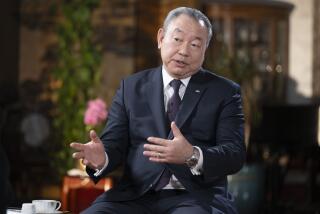Administration Unveils Asian Policy : Diplomacy: Tokyo partnership, ‘balanced’ relations with Beijing are planned, senators told.
- Share via
WASHINGTON — A nominee for a high-level post in the Clinton Administration gave the first overview of the new U.S. policies toward Asia on Wednesday, indicating that the Administration will place its highest priority on developing a lasting partnership with Japan and will aim for cooler but “balanced” relations with China.
Winston Lord, the Administration’s choice for assistant secretary of state for East Asia and the Pacific, used his confirmation hearing before the Senate Foreign Relations Committee to unveil a written statement on U.S. plans and goals for the region. The thrust of Lord’s message was that, although there will be some changes from the policies of the George Bush Administration, they will be less drastic than many Asian officials had feared.
“America has permanent interests. They do not change every four years,” Lord asserted.
Lord made it plain that the Clinton Administration intends to embrace the causes of democracy and human rights in Asia, flatly rejecting arguments that these are Western cultural values that conflict with the region’s Confucian and authoritarian traditions.
At the same time, Lord cautioned that the pursuit of human rights will not be the Administration’s only foreign policy goal and that “we must weigh geopolitical, economic and other factors.”
No senator opposed Lord’s nomination, and he is expected to be confirmed by the end of this week.
Once a protege of former Secretary of State Henry A. Kissinger, Lord, 55, served as U.S. ambassador to China from 1985 to 1989. After China’s repression of pro-democracy demonstrations in Beijing, he became the most prominent critic of the Bush Administration’s policy of reconciliation with the Chinese leadership.
There were echoes of these earlier criticisms in Wednesday’s statement, as Lord asserted that Chinese leaders “cling to an outdated authoritarian system.”
“We will seek cooperation with China on a range of issues. But Americans cannot forget Tian An Men Square,” he said, referring to the June, 1989, shooting of Chinese protesters by government troops.
Lord also made plain what President Clinton and Secretary of State Warren Christopher have already indicated, that the Administration wants to make any renewal of China’s most-favored-nation trade status conditional upon improvements in Beijing’s policies on human rights, trade and weapons proliferation.
Yet Lord’s testimony also contained some elements that will be welcomed by China’s top leadership. He repeatedly avoided any challenge to China’s claims to sovereignty over disputed areas.
He gave relatively short shrift to U.S. ties with Taiwan, which he emphasized are “unofficial.” He described the American commitment to Hong Kong in narrow terms, saying the United States has “large humanitarian and commercial stakes” there but should stay out of the negotiations between China and Britain over how much democracy there will be when Hong Kong returns to Chinese control in 1997.
And when Sen. Claiborne Pell (D-R.I.) asked whether Tibet is a sovereign nation, Lord was uncompromising. “Tibet is a part of China,” he answered. “There is no country in the world that recognizes its independence.”
On Japan, Lord’s policy statement sought to dispel anxieties that the Clinton Administration will let economic frictions dominate ties between Washington and Tokyo.
More to Read
Get the L.A. Times Politics newsletter
Deeply reported insights into legislation, politics and policy from Sacramento, Washington and beyond. In your inbox twice per week.
You may occasionally receive promotional content from the Los Angeles Times.








